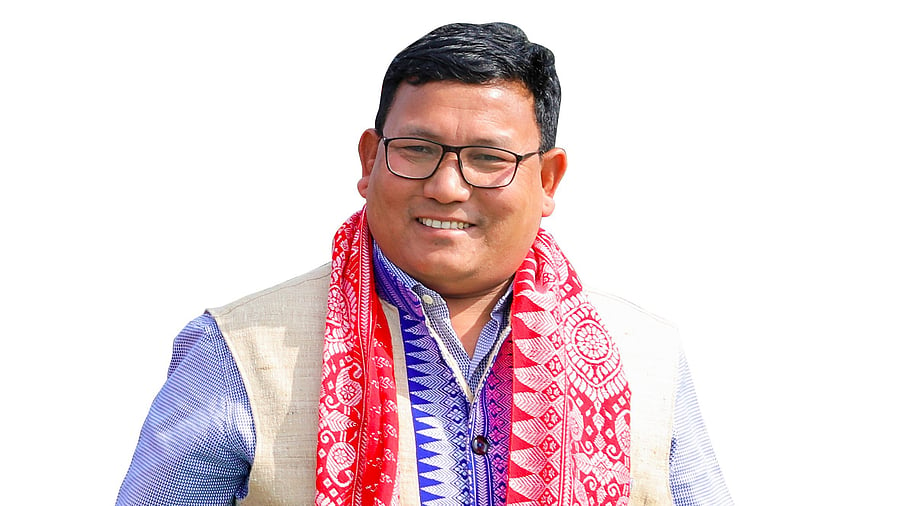
Chief Executive Member of Bodoland Territorial Council Pramod Boro.
Credit: Special Arrangement
Kokrajhar (Assam): Over the last 75 years, New Delhi has signed a host of accords and agreements for the devolution of powers to various ethnic groups in the Northeast.
The one reached with the National Democratic Front of Bodoland and other organisations in 2020 seeking a “permanent” solution to the Bodo issue led to the creation of the Bodoland Territorial Region (BTR) with enhanced executive and legislative powers.
The Bodoland Territorial Council (BTC) administers the BTR. The accord is unique in many ways.
The BTC is an autonomous authority in Assam’s Bodo tribal areas and administers four districts on the north bank of the Brahmaputra River, falling under the Bodoland Territorial Region (BTR). The BTR, set up under the 6th Schedule of the Constitution, comprises four districts — Kokrajhar, Chirang, Baska and Udalguri.
The BTC administers around 9,000 sq km of the BTR inhabited by more than 31 lakh people, including the Bodos, the single-largest Scheduled Tribe in Assam.
As five years have passed since the signing of the historic peace accord on January 27, 2020, the council is now demanding its inclusion in Article 280 of the Constitution to get more funds for the development of some remote districts that suffered decades of insurgency and are now on a peace path.
“Bodoland peace accord and the subsequent mission to transform this region as an economic hub is a model to all, particularly where insurgency is going on. We have already proved that if all groups join hands and resolve our issues amicably, we can achieve all kinds of prosperity,” says Pramod Boro, Chief Executive Member of BTC.
After preserving a fragile peace after a protracted insurgency that claimed more than 20,000 lives, the BTC has had to focus on governance issues to create jobs and spur development in the region.
As part of its efforts to address the livelihood issue through creating employment, the BTC promotes ecotourism through its national parks, homestays, agri-based rural industries, handicrafts and GI-tagged items.
Once a hiding place for the militants, the Ripu-Chirang Reserve Forest (RCRF) is now Raimona National Park housing endangered species like Golden Langurs. Poachers living around the forest have been engaged in anti-poaching teams and other tourism-related activities like wildlife safari vehicle drivers or guides.
“Though our tourism sector is in a nascent stage at the moment, we are building an ecosystem to attract more tourists. Apart from training our youth in hospitality management, we are encouraging investors to come and set up infrastructure including hotels and resorts,” Pramod Boro says.
Rafting on the Somkhos River is expected to start soon. Kokrajhar’s paragliding center will be opened for tourists this year. Efforts are also underway to create a tourism circuit connecting Bodoland with Sikkim, other northeastern states and Bhutan.
Given his experience of ethnic conflicts in Bodoland, the former student leader-turned-politician says usually two generations get impacted by such conflicts.
“I am appealing to all those indulging in violence to whether it is in Manipur or elsewhere to come to the path of peace. The Meiteis and the Kukis in Manipur have to decide their future agenda. I request both conflicting groups to try to understand what they are going to achieve through
this conflict and violence,” the BTC chief says.
According to the BTC, in the last five years, the agricultural sector has seen an increased productivity in the region.
In 2019-2020, transactions in the agriculture sector were worth Rs 1,900 crore, while in 2024 the figure was Rs 3,600 crore. Paddy production is more than 11 lakh metric tonnes.
Though the region lacks adequate infrastructure, significant investments have been made to promote sports over the last four years. A FIFA-standard football stadium has been constructed in Kokrajhar and various other sports disciplines are being promoted. Bodoland hosted the prestigious Durand Cup twice. Besides, scholarships are being provided to athletes.
The BTC is now demanding its inclusion in Article 280 of the Constitution to claim more funds for the development of underdeveloped areas.
Article 280(1) of the Constitution lays down the modalities for setting up a Finance Commission to make recommendations on the distribution of net proceeds of taxes between the Union and the States, allocation between the States of respective shares of such proceeds; grants-in-aid and the revenues of the States and measures needed to supplement the resources of the Panchayats during the award period.
